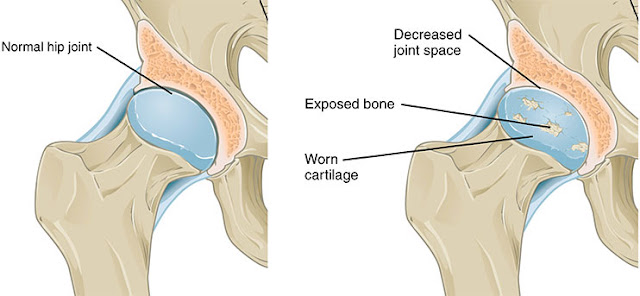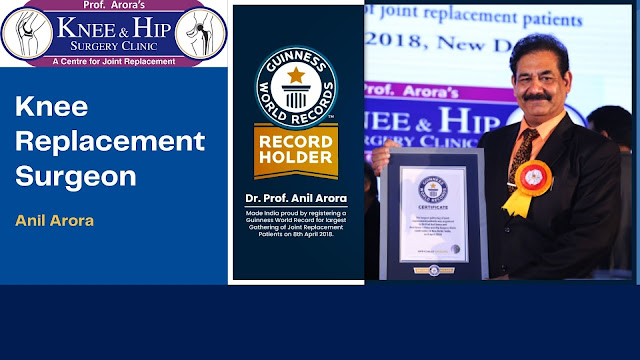How Safe and Successful Is Hip Replacement Surgery?
Hip replacement surgery:
The hip replacement procedure is not new. It is, in fact, one of the most important and successful surgeries in the Orthopaedic community. Nearly every Orthopaedic surgeon is trained in joint replacement surgery. Patients who are excited about having a hip replacement done often become skeptical. Hands down. This article will provide you with all the details about the procedure and the top Hip Replacement surgeons in Delhi and the surrounding areas.
What is Hip Replacement Surgery?
A hip replacement is a corrective surgery to repair a damaged hip joint. The patient suffers from severe pain in the hip joint and is unable or unwilling to walk normally due to the injury. Your Orthopedic surgeon may recommend hip replacement surgery to solve this problem.
Read More: PINLESS COMPUTER NAVIGATED KNEE REPLACEMENT
Anatomy of the Hip Joint:
Before we get into the details of hip replacement surgery, let's first understand what a hip joint is. Two bones make up the hip joint: Pelvis (hip bone), and Femur (thighbone). The head of a femur bone connects to the acetabulum cavity in the pelvic bone. The joint is not only made up of tough bones but also includes ligaments and tendons. The synovial membrane, which secretes synovial liquid, surrounds the joint. What is the purpose of this fluid? It helps to reduce friction between bones and facilitate movement.
Common Causes
There is always a reason for every damage. The same goes for damaged hip joints. There are many reasons.
Arthritis- This causes stiff hip joints and constant pain. Arthritis is caused by the end bones of the joint rubbing against each other, causing inflammation. There are two main types of arthritis: osteoarthritis, which is caused by age and obesity, and Rheumatoid arthritis, which is a genetic disorder that causes the destruction of joints.
Osteonecrosis - A hip injury such as a fracture or dislocation can cause a reduction or cessation of blood supply. This causes the death of many cells, and the ends of the joint become closer. This leads to arthritis.
Hip disease in childhood-Sometimes, children, and babies have problems with their hips. Although hip problems can be treated efficiently throughout adolescence they could still cause arthritis later in life. Because the hip may not grow normally and the joint surfaces might be affected, this can happen.
Read More: ARTHROSCOPIC ACL RECONSTRUCTION
Description
A highly skilled joint replacement surgeon performs hip joint surgery. This procedure is also known as Hip Arthroplasty. This surgery involves the removal of the affected bone and associated cartilage and replacing them with prosthetic parts. These are the types of replacements:
Replacing a Damaged Femoral Head - The damaged femoral skull is removed and replaced by a metal stem. This is placed in the hollow middle of the femur. The femoral stem can be cemented or "press-fit" into bone.
Placement of a Metal Ball- A ceramic or metal ball is placed on the stem's top to replace the injured femoral head.
Medical-grade Spacer - To allow for smooth movement, a medical-grade spacer is placed between the socket and the ball.
Implants
Hip arthroplasty can be performed using a variety of materials and structures. There are two components to them. The ball is made from very thin metal or ceramic material. The socket component is made up of durable plastic, ceramic, metal cup, or shell. Your Joint Replacement surgeon will "press" the part against the bone. This allows the bone to grow around the component or glue it in place. A variety of factors are considered when deciding whether to bond or compress a component. There are many combinations of cement rods with cementless couplings.
Procedure:
The average time for hip replacement surgery is between 1-3 hours, depending on the condition of the patient. Your Hip Replacement Surgeon will first remove any damaged cartilage or bone and then replace it with prosthetics made of metal, plastic, or ceramic.
Recovery
Many factors influence the recovery of hip replacement surgery.
Patient's conditions.
The surgeon's experience.
Post-surgical care.
Rehabilitation.
Who are the Top Hip Replacement Surgeons in Delhi and the Surrounding Areas?
Dr. Anil Arora, a top Knee and Hip Replacement surgeon in Delhi and the surrounding areas is a great choice. His team has helped many people with impaired mobility. They have more than 20 years of combined experience in Joint Replacement surgery and international fellowships.
Read More: SHOULDER JOINT REPLACEMENT
Orthopedic Evaluation by Dr. Anil Arora:
This is how Dr. Anil Arora assesses his patients prior to the surgery.
Evaluation of Medical History- Dr. Anil Arora information about your health, ask questions about hip pain and your ability to perform daily activities. This will help him make a decision about surgery.
Physical Evaluation- Dr. Anil Arora will perform a physical examination on the patient. This is used to evaluate hip strength, mobility, and alignment.
Investigations - Dr. Anil Arora suggests that the patient undergo an X-RAY examination to see the inside of the joint. If necessary, the patient may also be asked to order tests such as MRI, which will evaluate the nuances within the joints.
The Decision of the Surgery - After all details have been analyzed, Dr. Anil Arora makes the final decision about hip replacement surgery.
Preparing your Skin- Dr. Anil Arora, a highly skilled surgeon, is very thorough and evaluates his patients before he performs any type of surgery.
Preparing the Patient - Dr. Anil Arora asks patients to discontinue any medications that may be harmful to their skin prior to surgery.
Weight loss- An increased risk factor for osteoarthritis, is weight loss. Dr. Anil Arora recommends that patients lose weight prior to surgery in order to eliminate any risk afterward.
Counseling- Although counseling is not required for the planning of the surgery, it is necessary. This assists the patient in getting ready for surgery and decreases fear about the equipment or surgery.
Anesthesia- The anesthetic team at Dr. Anil Arora gives the appropriate type of anesthesia to the patient on the day of surgery. The patient's condition will determine the type of anesthesia that is used.
Post-surgical Care - Dr. Anil Arora and his team continue to care for the patient after the surgery has been completed. He and his team ensure that the patient's comfort is maintained and the rehabilitation program is followed up. For pain relief after surgery, the patient is prescribed painkillers. The patient is advised to take antibiotics to prevent infection. Blood thinners, support hoses, and inflatable leg covers are also recommended to reduce the risk of blood clot formation.
Physical Therapy- The patient should be treated with post-surgical physiotherapy to regain strength and power. Dr. Anil Arora, from Jointreplacementdelhi, ensures that patients receive regular Physiotherapy.
Home Care Program- The patient should be provided with proper home care. There are several things that can be done to prevent post-operative risks like blood clot formation and impaired mobility. This is an important step and should not be taken lightly.
For expert advice and treatment, Dr. Anil Arora is a great choice if you're looking to have hip replacement surgery in Delhi.




Nice post
ReplyDeleteGet consultation for shoulder arthroscopy from Dr. Lalit Bafna for best shoulder arthroscopy in Delhi